- Home
- Hilary Mantel
Beyond Black: A Novel Page 2
Beyond Black: A Novel Read online
Page 2
Instead Colette asked for an armchair, wide, capacious. Here, ideally, Alison would begin the evening, relaxed, ankles crossed, steadying her breathing before her opening remarks. At the first hint of a contact, she would lean forward; then she would jump up and advance to the front of the stage. She would hang over the audience, almost floating above their heads, her lucky opals flashing fire as she reached out, fingers spread. She’d got the lucky opals mail-order but, if asked, she pretended they’d been left to her family by a Russian princess.
She had explained it all when Colette first joined her. Russia was favourite for ancestors, even better than Romany, nowadays; you didn’t want to put anxiety in the clients’ minds, about fly-tipping, head lice, illegal tarmac gangs, or motorhomes invading the Green Belt. Italian descent was good, Irish was excellent—though you must be selective. In the Six Counties hardly anywhere would do—too likely to crop up on the news. For the rest, Cork and Tipperary sounded too comic, Wicklow and Wexford like minor ailments, and Waterford was too dull.
“Al,” Colette said, “from where do you derive your amazing psychic gifts tonight?”
Al said at once, in her platform voice, “From my old great-grandmother, in County Clare. Bless her.”
Bless her and bless her, she said, under her breath. She looked away from the mirror so Colette wouldn’t see her lips moving. Bless all my great-grandmothers, whoever and wherever they may be. May my dad rot in hell, whoever he may be; whatever hell is and wherever, let him rot in it; and let them please lock the doors of hell at night, so he can’t be out and about, harassing me. Bless my mum, who is still earthside of course, but bless her anyway; wouldn’t she be proud of me if she saw me in chiffon, each inch of my flesh powdered and perfumed? In chiffon, my nails lacquered, with my lucky opals glittering—would she be pleased? Instead of being dismembered in a dish, which I know was her first ambition for me: swimming in jelly and blood. Wouldn’t she like to see me now, my head on my shoulders and my feet in my high-heeled shoes?
No, she thought, be realistic: she wouldn’t give a toss.
Ten minutes to go. Abba on the sound system, “Dancing Queen.” Glass of gin held in one hand, the bottle of tonic looped by her little finger, Colette peeped through a swing door at the back of the hall. Every seat was full and space was tight. They were turning people away, which the manager hated to do but it was fire regulations. How does it feel tonight? It feels all right. There’d been nights when she’d had to sit in the audience, so Alison could pick her out first and get the show going, but they didn’t like doing that and they didn’t need to do it often. Tonight she would be flitting around the hall with a microphone, identifying the people Al picked out and passing the mike along the rows so she could get clear answers out of them. We’ll need three minimum to cover the space, she’d told the manager, and no comedians who trip over their own feet, please. She herself, fast and thin and practiced, would do the work of two.
Colette thought, I can’t stand them now: the clients, the punters, the trade. She didn’t like to be among them, for any purpose. She couldn’t believe that she was ever one of them: lining up to listen to Al, or somebody like her. Booking ahead (all major cards accepted) or jostling in a queue by the box office: a tenner in her fist, and her heart in her mouth.
Alison twisted her rings on her fingers: the lucky opals. It wasn’t nerves exactly, more a strange feeling in her diaphragm, as if her gut were yawning: as if she were making space for what might occur. She heard Colette’s footsteps: my gin, she thought. Good-good. Carefully, she took the mint out of her mouth. The action left her lips sulky; in the mirror, she edged them back into a smile, using the nail of her third finger, careful not to smudge. The face does disarrange itself; it has to be watched. She wrapped the mint in a tissue, looked around, and looped it hesitantly towards a metal bin a few feet away. It fell on the vinyl.
Morris grunted with laughter. “You’re bloody hopeless, gel.”
This time, as Colette came in, she managed to step over Morris’s legs. Morris squawked out, “Tread on me, I love it.”
“Don’t you start!” Al said. “Not you. Morris. Sorry.”
Colette’s face was thin and white. Her eyes had gone narrow, like arrow slits. “I’m used to it.” She put the glass down by Alison’s eyelash curlers, with the bottle of tonic water beside it.
“A splash,” Al directed. She picked up her glass and peered into the fizzing liquid. She held it up to the light.
“I’m afraid your ice has melted.”
“Never mind.” She frowned. “I think there’s someone coming through.”
“In your G and T?”
“I think I caught just a glimpse. An elderly person. Ah well. There’ll be no lolling in the old armchair tonight. Straight on with the show.” She downed the drink, put the empty glass on the countertop with her strewn boxes of powder and eye shadow. Morris would lick her glass while she was out, running his yellow fissured tongue around the rim. Over the public address system, the call came to switch off cell phones. Al stared at herself in the mirror. “No more to be done,” she said. She inched to the edge of her chair, wobbling a little at the hips. The manager put his face in at the door. “All right?” Abba was fading down: “Take a Chance on Me.” Al took a breath. She pushed her chair back; she rose and began to shine.
She walked out into the light. The light, she would say, is where we come from, and it’s to the light we return. Through the hall ran small detonations of applause, which she acknowledged only with a sweep of her thick lashes. She walked, slowly, right to the front of the stage, to the taped line. Her head turned. Her eyes searched, against the dazzle. Then she spoke, in her special platform voice. “This young lady.” She was looking three rows back. “This lady here. Your name is—? Well, Leanne, I think I have a message for you.”
Colette released her breath from the tight space where she held it.
Alone, spotlit, perspiring slightly, Alison looked down at her audience. Her voice was low, sweet, and confident, and her aura was a perfectly adjusted aquamarine, flowing like a silk shawl about her shoulders and upper arms. “Now Lee, I want you to sit back in your seat, take a deep breath, and relax. And that goes for all of you. Put on your happy faces—you’re not going to see anything that will frighten you. I won’t be going into a trance, and you won’t be seeing spooks, or hearing spirit music.” She looked around, smiling, taking in the rows. “So why don’t you all sit back and enjoy the evening? All I do is, I just tune in, I just have to listen hard and decide who’s out there. Now, if I get a message for you, please raise your hand, shout up—because if you don’t, it’s very frustrating for the spirits trying to come through. Don’t be shy, you just shout up or give me a wave. Then my helpers will rush to you with the microphone—don’t be afraid of it when it comes to you, just hold it steady and speak up.”
They were all ages. The old had brought cushions for their bad backs; the young had bare midriffs and piercings. The young had stuffed their coats under their chairs, but their elders had rolled theirs and held them on their knees like swaddled babies. “Smile,” Al told them. “You’re here to enjoy yourselves, and so am I. Now, Lee my love, let me get back to you—where were we? There’s a lady here called Kathleen, who’s sending lots of love in your direction. Who would that be, Leanne?”
Leanne was a dud. She was a young lass of seventeen or so, hung about with unnecessary buttons and bows, her hair in twee little bunches, her face peaky. Kathleen, Al suggested, was her granny: but Leanne wouldn’t own it because she didn’t know her granny’s name.
“Think hard, darling,” Al coaxed. “She’s desperate for a word with you.”
But Lee shook her bunches. She said she didn’t think she had a granny; which made some of the audience snigger.
“Kathleen says she lives in a field, at a certain amount of money … bear with me … Penny. Penny Meadow, do you know that address? Up the hill from the market—such a pull, she says, when you’ve
got a bag full of potatoes.” She smiled at the audience. “This seems to be before you could order your groceries online,” she said. “Honestly, when you think how they lived in those days—we forget to count our blessings, don’t we? Now Lee, what about Penny Meadow? What about Granny Kathleen walking uphill?”
Leanne indicated incredulity. She lived on Sandringham Court, she said.
“Yes, I know,” Al said. “I know where you live, sweetheart, but this isn’t anywhere around here, it’s a filthy old place, Lancashire, Yorkshire, I’m getting a smudge on my fingers, it’s grey, it’s ash, it’s something below the place you hang the washing—could it be Ashton-under-Lyne? Never mind,” Alison said. “Go home, Leanne, and ask your mum what Granny was called. Ask her where she lived. Then you’ll know, won’t you, that she was here for you tonight.”
There was a patter of applause. Strictly speaking, she hadn’t earned it. But they acknowledged that she’d tried; and Leanne’s silliness, deeper than average, had brought the audience over to her side. It was not uncommon to find family memory so short, in these towns where nobody comes from, these southeastern towns with their floating populations and their car parks where the centre should be. Nobody has roots here; and maybe they don’t want to acknowledge their roots or recall their grimy places of origin and their illiterate foremothers up north. These days, besides, the kids don’t remember back more than eighteen months—the drugs, she supposed.
She was sorry for Kathleen, panting and striving, her wheezy goodwill evaporating, unacknowledged; Penny Meadow and all the rows about seemed shrouded in a northern smog. Something about a cardigan, she was saying. A certain class of dead people was always talking about cardigans. The button off it, the pearl button, see if it’s dropped behind the dresser drawer, that little drawer, that top drawer, I found a threepenny bit there once, back of the drawer, it gets down between the you-know, slips down the whatsit, it’s wedged like—and so I took it, this threepence, and I bought me friend a cake with a walnut on top. Yes, yes, Al said, they’re lovely, those kind of cakes: but it’s time to go, pet. Lie down, Kathleen. You go and have a nice lie-down. I will, Kathleen said, but tell her I want her mum to look for that button. And by the way, if you ever see my friend Maureen Harrison, tell her I’ve been looking for her this thirty year.
Colette’s eyes darted around, looking for the next pickup. Her helpers were a boy of seventeen, in a sort of snooker player’s outfit, a shiny waistcoat and a skewed bow tie; and, would you believe it, the dozy little slapper from the bar. Colette thought, I’ll need to be everywhere. The first five minutes, thank God, are no guide to the evening to come.
Look, this is how you do it. Suppose it’s a slow night, no one in particular pushing your buttons; only the confused distant chitchat that comes from the world of the dead. So you’re looking around the hall and smiling, saying, “Look, I want to show you how I do what I do. I want to show you it’s nothing scary, it’s just, basically, abilities that we all have. Now can I ask, how many of you,” she pauses, looks around, “how many of you have sometimes felt you’re psychic?”
After that it’s according to, as Colette would say, the demographics. There are shy towns and towns where the hands shoot up, and of course as soon as you’re onstage you can sense the mood, even if you weren’t tipped off about it, even if you’ve never been in that particular place before. But a little word, a word of encouragement, a “don’t hold back on me,” and sooner or later the hands go up. You look around—there’s always that compromise between flattering stage lighting and the need to see their faces. Then you choose a woman near the front, not so young as Leanne but not so old she’s completely buggered up, and you get her to tell you her name.
“Gillian.”
Gillian. Right. Here goes.
“Gill, you’re the sort of woman—well”—she gives a little laugh and a shake of her head—“well, you’re a bit of a human dynamo, I mean that’s how your friends describe you, isn’t it? Always on the go, morning, noon, and night, you’re the sort of person, am I right, who can keep all the plates spinning? But if there’s one thing, if there’s one thing, you know, all your friends say, it’s that you don’t give enough time to yourself. I mean, you’re the one everybody depends on, you’re the one everybody comes to for advice, you’re the Rock of Gibraltar, aren’t you, but then you have to say to yourself, hang on, hang on a minute, who do I go to when I want advice? Who’s there for Gilly, when it comes to the crunch? The thing is you’re very supportive, of your friends, your family, it’s just give give give, and you do find yourself, just now and then, catching yourself up and saying, hang on now, who’s giving back to me? And the thing about you, Gillian—now stop me if you think I’m wrong—is that you’ve got so much to give, but the problem is you’re so busy running round picking up after other people and putting their lives to rights, that you haven’t hardly got any opportunity to develop your own—I mean your own talents, your own interests. When you think back, when you think back to what made you happy as a young girl, and all the things you wanted out of life—you see, you’ve been on what I call a Cycle of Caring, and it’s not given you, Gill, it’s not given you the opportunity to look within, to look beyond. You really are capable, now I’m not telling you this to flatter you, but you really are capable of the most extraordinary things if you put your mind to it, if you just give all those talents of yours a chance to breathe. Now am I right? Say if I’m not right. Yes, you’re nodding. Do you recognize yourself?”
Gillian has of course been nodding since the first time Al paused for breath. In Alison’s experience there’s not a woman alive who, once past her youth, doesn’t recognize this as a true and fair assessment of her character and potential. Or there may be such a woman, out in some jungle or desert, but these blighted exceptions are not likely to be visiting Alison’s Evening of Psychic Arts.
She is now established as a mind reader; and if she can tell Gillian something about herself, her family, so much the better. But she’s really done enough—Gillian’s brimming with gratification—so even if nobody comes through from Spirit, she can just move right on to whoever is her next target. But long before this point Alison has become conscious of a background mutter (at times rising to a roar) situated not there in the hall but towards the back of her skull, behind her ears, resonating privately in the bone. And on this evening, like every other, she fights down the panic we would all feel, trapped with a crowd of dead strangers whose intentions towards us we can’t know. She takes a breath, she smiles, and she starts her peculiar form of listening. It is a silent sensory ascent; it is like listening from a stepladder, poised on the top rung; she listens at the ends of her nerves, at the limit of her capacities. When you’re doing platform work, it’s rare that the dead need coaxing. The skill is in isolating the voices, picking out one and letting the others recede—making them recede, forcing them back if need be, because there are some big egos in the next world. Then taking that voice, the dead voice you’ve chosen, and fitting it to the living body, to the ears that are ready to hear.
So: time to work the room. Colette tensed, forward on her toes, ready to sprint with the mike. “This lady. I feel some connection with the law here. Do you have to see a solicitor?”
“Constantly,” the woman said. “I’m married to one.”
There was a yell of laughter. Al joined it. Colette smirked. She won’t lose them now, she thought. Of course she wanted Al to succeed; of course I do, she told herself. They had a joint mortgage, after all; financially they were tied together. And if I quit working for her, she thought, how would I get another job? When it comes to YOUR LAST POSITION, what would I put on my CV?
“Who’s got indigestion at the back?” Al’s forehead was damp, the skin at the nape of her neck was clammy. She liked to have clothes with pockets so she could carry a folded cologne tissue, ready for a surreptitious dab, but you don’t usually get pockets in women’s clothes, and it looks stupid taking a handbag out on stage
. “This lady,” she said. She pointed; the lucky opals winked. “This is the one I’m speaking to. You’re the one with the heartburn, I can feel it. I have someone here for you who’s very happy in Spirit World, a Margo, Marje, can you accept that? A petite woman wearing a turquoise blouse, she was very fond of it, wasn’t she? She says you’ll remember.”
“I do remember, I do,” the woman said. She took the mike gingerly and held it as if it might detonate. “Marje was my aunt. She was fond of turquoise and also lilac.”
“Yes,”—and now Al softened her voice—“and she was like a mother to you, wasn’t she? She’s still looking out for you, in Spirit World. Now tell me, have you seen your GP about that indigestion?”
“No,” the woman said. “Well, they’re so busy.”
“They’re well paid to look after you, my love.”
“Coughs and colds all around you,” the woman said. “You come out worse than you went in—and you never see the same doctor twice.”
There was an audible smirk from the audience, a wash of fellow feeling. But the woman herself looked fretful. She wanted to hear from Marje: the dyspepsia she lived with every day.
“Stop making excuses.” Al almost stamped her foot. “Marje says, why are you putting it off? Call the surgery tomorrow morning and book yourself in. There’s nothing to be frightened of.”

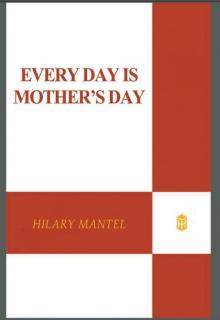 Every Day Is Mother's Day
Every Day Is Mother's Day An Experiment in Love
An Experiment in Love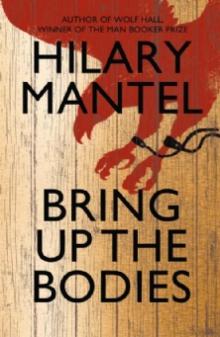 Wolf Hall
Wolf Hall A Place of Greater Safety
A Place of Greater Safety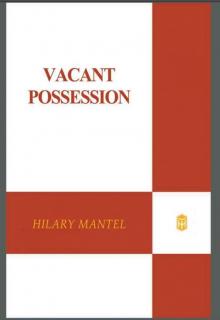 Vacant Possession
Vacant Possession The Giant, O'Brien
The Giant, O'Brien Beyond Black
Beyond Black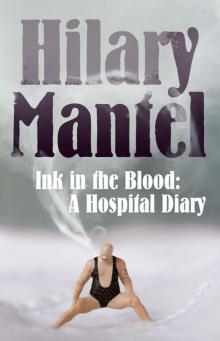 Ink in the Blood: A Hospital Diary
Ink in the Blood: A Hospital Diary The School of English
The School of English Giving Up the Ghost
Giving Up the Ghost The Mirror and the Light: 2020’s highly anticipated conclusion to the best selling, award winning Wolf Hall series (The Wolf Hall Trilogy, Book 3)
The Mirror and the Light: 2020’s highly anticipated conclusion to the best selling, award winning Wolf Hall series (The Wolf Hall Trilogy, Book 3) Fludd
Fludd Eight Months on Ghazzah Street
Eight Months on Ghazzah Street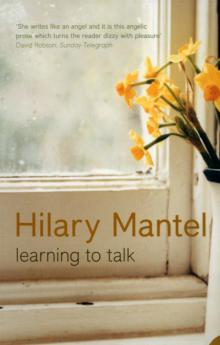 Learning to Talk
Learning to Talk How Shall I Know You?: A Short Story
How Shall I Know You?: A Short Story A Change of Climate
A Change of Climate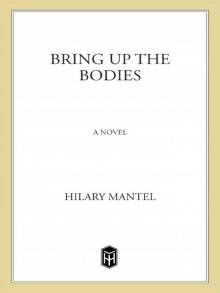 Bring Up the Bodies
Bring Up the Bodies The Assassination of Margaret Thatcher: Stories
The Assassination of Margaret Thatcher: Stories Beyond Black: A Novel
Beyond Black: A Novel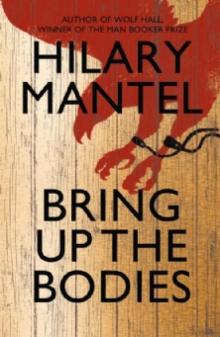 Wolf Hall: Bring Up the Bodies
Wolf Hall: Bring Up the Bodies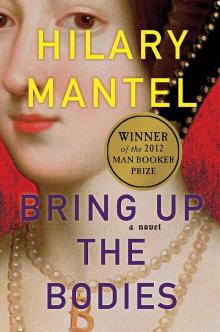 Bring Up the Bodies tct-2
Bring Up the Bodies tct-2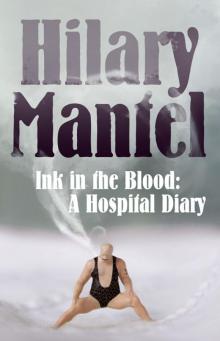 Ink in the Blood
Ink in the Blood The Assassination of Margaret Thatcher
The Assassination of Margaret Thatcher Eight Months on Ghazzah Street: A Novel
Eight Months on Ghazzah Street: A Novel How Shall I Know You?
How Shall I Know You? A Change of Climate: A Novel
A Change of Climate: A Novel The Giant, O'Brien: A Novel
The Giant, O'Brien: A Novel Fludd: A Novel
Fludd: A Novel A Place of Greater Safety: A Novel
A Place of Greater Safety: A Novel An Experiment in Love: A Novel
An Experiment in Love: A Novel